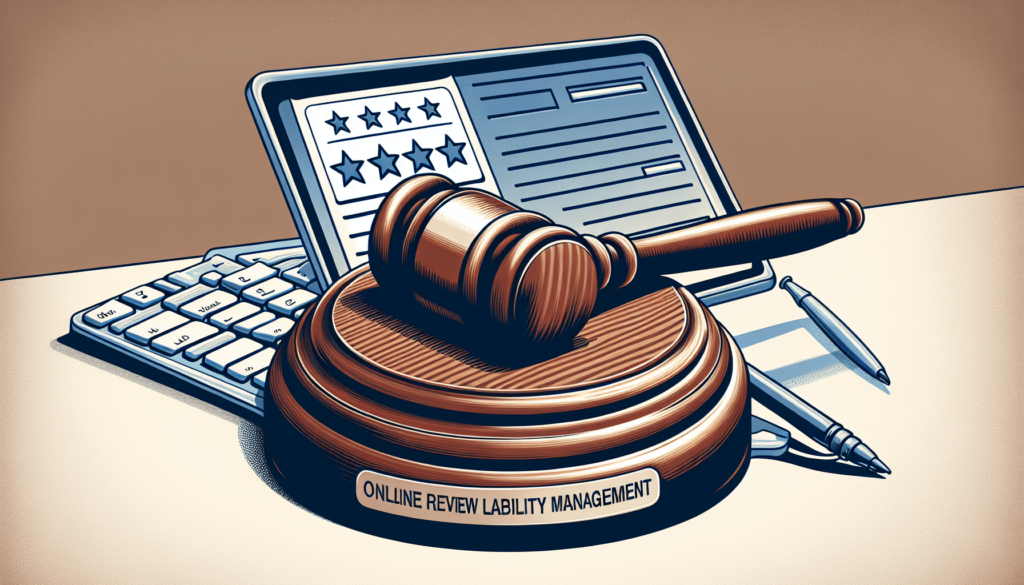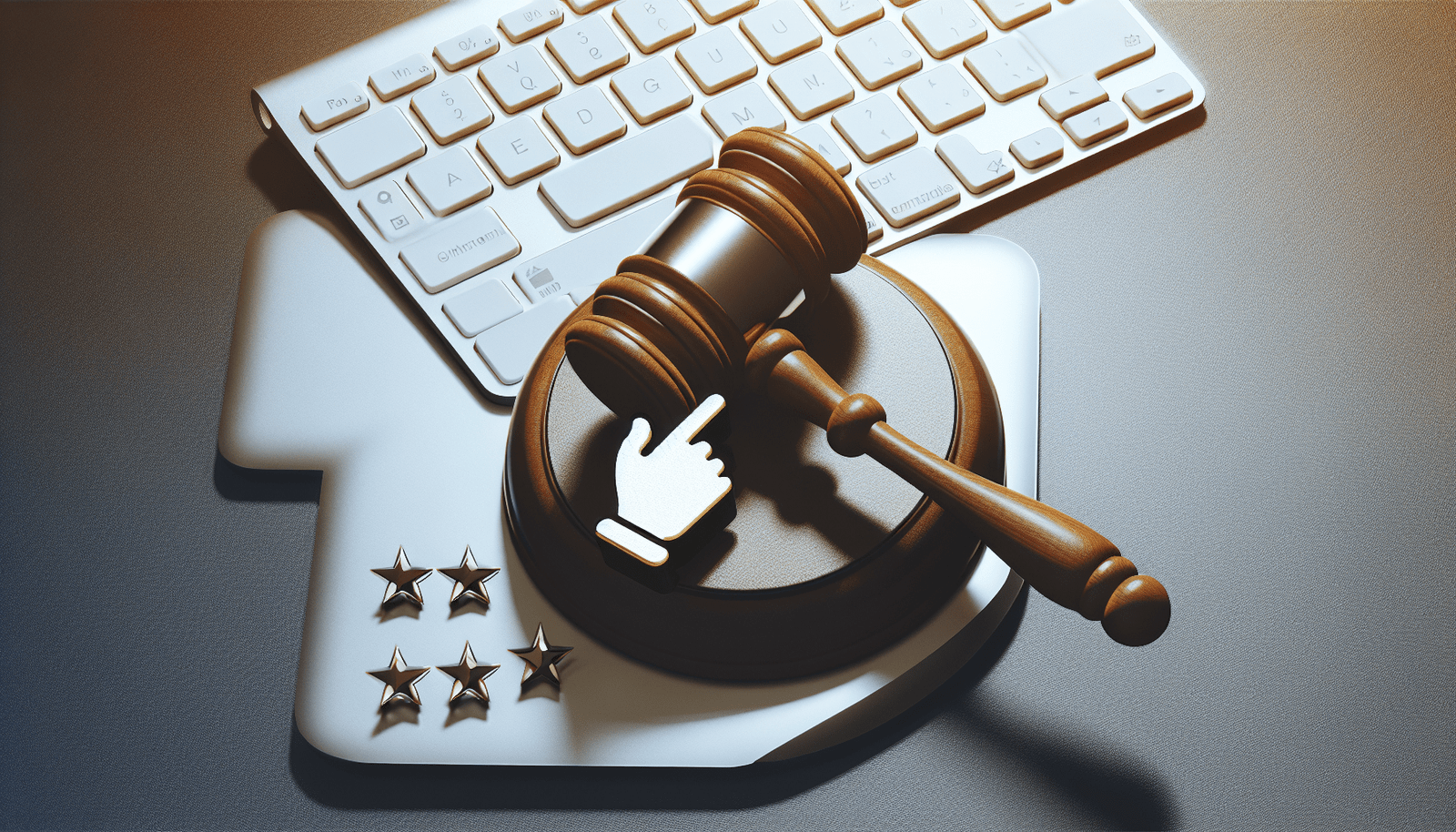Managing Liability for Online Reviews is a crucial topic for any business operating in the digital space. I understand firsthand the anxiety that online reviews can bring, especially when they steer towards negativity. Reviews can make or break your reputation, impacting your bottom line. This article delves into the nuances of managing the legal liabilities associated with online reviews, offering practical advice and strategies to ensure your business stays on the right side of the law. Whether it’s understanding defamation risks, navigating platform policies, or protecting your brand from unjust criticism, this piece covers it all, in a way that’s both informative and easily digestible. Have you ever posted a review online about a product or service and wondered if it could get you into trouble? Online reviews are a double-edged sword—they can help businesses grow and succeed, or they can damage reputations in a matter of clicks. As someone who frequently leaves reviews and occasionally runs into confusion about the legal implications, I’ve dived deep into understanding how to manage liability for online reviews. Let’s take a friendly and detailed stroll through the ups and downs of online review liability, shall we?
Managing Liability for Online Reviews

The Power and Peril of the Online Review
In the age of the internet, everyone and their grandmothers have become critics. Gone are the days when a smile from a shopkeeper or a scowl from a waiter stayed within the confines of your local community. Today, your experience can be broadcast to millions with just a few taps on your phone. But what if that scathing review you left last week comes back to haunt you legally?
My First Brush with Online Review Drama
I thought I was doing a good deed by warning others about a subpar service. Little did I know, my harmless review could stir up a hornet’s nest of legal issues. Turns out, managing liability for online reviews isn’t as straightforward as it seems.
The Legal Landscape of Online Reviews
The laws and regulations surrounding online reviews vary greatly from one country to another. However, they usually boil down to a few key considerations: defamation, false advertising, and intellectual property rights.
Defamation: When Opinions Cross the Line
Defamation is a tricky beast. It’s the act of communicating false statements about a person, business, or product that can harm their reputation. Think of it as the ultimate bad-mouthing. But where does one draw the line between sharing a personal opinion and committing defamation?
The key here is truth and intent. If your review is truthful and based on personal experience, you’re generally safe. But if you exaggerate or fabricate details to tarnish a reputation, you could be stepping into defamation territory.
False Advertising: The Risks for Businesses
For businesses, the stakes are high. False advertising includes making misleading claims about a product or service. It’s not just about protecting consumers; false advertising can lead to significant liability issues for businesses. This flips the script: while consumers need to avoid defamatory statements, businesses must ensure they don’t exaggerate or mislead in their marketing.
Intellectual Property Rights: Avoiding Infringement
Another aspect to consider is intellectual property rights. Ever taken a picture of a product or company logo for a review? While this might seem harmless, using someone else’s intellectual property without permission can land you in hot water. Always respect copyrights and trademarks when posting online reviews.
How to Write Safe and Effective Online Reviews
So, how do we navigate the murky waters of online review liability without stifling our right to express honest opinions? Here are some practical tips to keep you out of legal trouble while still sharing your experiences:
Be Honest and Factual
The golden rule of writing any review is honesty. Stick to the facts and your actual experiences. This doesn’t mean you can’t voice dissatisfaction; just ensure your grievances are grounded in reality.
Avoid Exaggeration and Hyperbole
Sure, it might feel good to vent and say that restaurant served the worst meal of your life, but unless you’re a culinary expert who can back up that claim, it’s best to tone it down. Use language that’s measured and reasonable.
Steer Clear of Personal Attacks
Critiquing a service or product is fair game; attacking individuals, however, is not. Keep your comments focused on the performance and quality of the goods or services rather than the people behind them.
Verify Before You Post
If your review includes factual claims, make sure you double-check them. This is particularly crucial for business-related reviews involving claims about policy or pricing that could damage a company’s reputation.
Online Platforms and Their Role
Did you know that the platform where you post your review also has a role in managing liability? From Yelp to Amazon, different platforms have their own policies and protective measures.
Review Moderation and Content Guidelines
Most platforms have stringent guidelines to filter out defamatory or misleading reviews. While this might feel like censorship, it’s more about safeguarding everyone involved—reviewers, businesses, and the platform itself.
Reporting Mechanisms for Disputes
Platforms also provide ways to report problematic reviews. If you find yourself wrongly accused of defamation or false advertising, use the platform’s reporting tools to resolve the issue.
| Platform | Reporting Tools | Review Moderation |
|---|---|---|
| Yelp | Yes | Automated and Manual |
| Amazon | Yes | Automated |
| Yes | Manual |

Legal Protections for Reviewers
Luckily, it’s not all doom and gloom. Various laws exist to protect our right to free speech, even online. In the United States, the Consumer Review Fairness Act (CRFA) is a great example.
The Consumer Review Fairness Act (CRFA)
Enacted in 2016, the CRFA protects consumers from being silenced by businesses through non-disparagement clauses in contracts. Essentially, it means you can share your honest opinions without fearing legal repercussions from the business itself.
The Business Perspective on Online Reviews
Now, let’s switch gears and view this from a business owner’s perspective. Seeing a negative review can be gut-wrenching, but it’s not the end of the world. How a business responds can actually enhance its reputation.
Engaging with Negative Reviews
A polite, constructive response to a negative review can portray the business as both professional and eager to improve. Think of it as a public customer service opportunity. It’s like getting a second chance to impress the customer while showing potential clients that you care.
Addressing False Claims
When it comes to false claims, businesses should collect evidence and report the review to the platform. In severe cases, legal action may be necessary, but most disputes are settled through the platform’s dispute resolution process.
Legal Tools for Businesses
Businesses can also protect themselves through well-drafted terms and conditions. A good lawyer can help craft clauses that allow for honest reviews while protecting against defamation and false claims.
The Future of Online Reviews: Emerging Trends and Technologies
With advancements in technology, the landscape of online reviews is evolving. Emerging technologies like Blockchain, AI, and VR/AR are making waves, and each brings its own set of challenges and opportunities.
Blockchain for Authenticity
Blockchain technology promises to enhance the credibility of online reviews. By creating an immutable ledger of reviews, Blockchain can reduce the incidence of fake reviews and provide transparent, trustworthy feedback.
AI and Machine Learning
AI is stepping in to help platforms better moderate content. Machine learning algorithms can detect patterns that indicate fake or defamatory reviews, making it easier to manage liability.
VR/AR Experiences
As VR and AR become more mainstream, the way we interact and review products and services will change. Imagine “walking through” a hotel room before booking it, then leaving a review based on your virtual experience. This also brings up new legal questions about the liability of virtual experiences.
Conclusion: Keep It Real and Respectful
Navigating the complex world of online reviews doesn’t have to be daunting. With honesty, respect, and an understanding of the legal framework, you can share your opinions freely and responsibly. Whether you’re posting a glowing review of your favorite local coffee shop or highlighting the flaws in a new gadget, remember: your words have power. Use them wisely.
So, next time you’re tempted to pen a review, consider the potential legal ripples it could create. Stay honest and measured, and you’ll keep both your conscience and legal record squeaky clean. Happy reviewing, and may your next feedback be as enlightening as it is safe!



